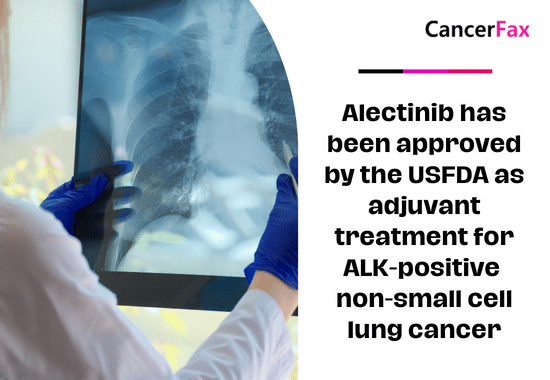Alectinib approved in the treatment of non-small cell lung cancer
The Food and Drug Administration (FDA) has approved the drug Alecensa, made by Genentech, Inc. It can be used as an extra treatment for people who have had tumor removal and have anaplastic lymphoma kinase (ALK)-positive non-small cell lung cancer (NSCLC). This approval is contingent upon the detection of ALK-positive NSCLC using an FDA-approved test.
Effectiveness and Security
In a worldwide, randomized, open-label clinical trial (ALINA, NCT03456076), people with ALK-positive NSCLC who had had the tumor completely removed showed that the treatment worked. To be eligible, patients had to have non-small cell lung Cancer in Stages IB (tumors 4 cm or larger) to IIIA that could be removed surgically, according to the 7th edition of the American Joint Committee on Cancer staging system.
Also, changes in the ALK gene had to be found by either an FDA-approved ALK test done locally or a VENTANA ALK (D5F3) CDx assay done centrally. There were 257 individuals who were randomly assigned in a 1:1 ratio to either receive alectinib 600 mg orally twice daily or platinum-based chemotherapy after their tumor was removed.
People with stage II–IIIA NSCLC and people in the whole study population (stage IB–IIIA) were judged on their disease-free survival (DFS) to see how well the treatment worked. The median disease-free survival (DFS) for people with stage II–IIIA NSCLC who were given alectinib could not be found (95% confidence interval [CI]: not estimable [NE], NE). In contrast, patients who received chemotherapy had a median DFS of 44.4 months (95% CI: 27.8, NE).
The hazard ratio (HR) for DFS in the alectinib arm compared to the chemotherapy arm was 0.24 (95% CI: 0.13, 0.45), with a p-value of less than 0.0001. The whole trial population showed similar findings, with the median disease-free survival (DFS) not yet determined (95% CI: NE, NE) in the group receiving alectinib, and 41.3 months (95% CI: 28.5, NE) in the group receiving chemotherapy (HR 0.24 [95% CI: 0.13, 0.43]; p<0.0001).
The predominant (≥ 20%) side effects observed in individuals on alectinib included hepatotoxicity, constipation, myalgia, COVID-19, fatigue, rash, and cough.
The suggested dosage of alectinib is 600 mg taken orally twice a day along with food for a duration of 2 years or until the reappearance of the disease or the occurrence of intolerable side effects.


